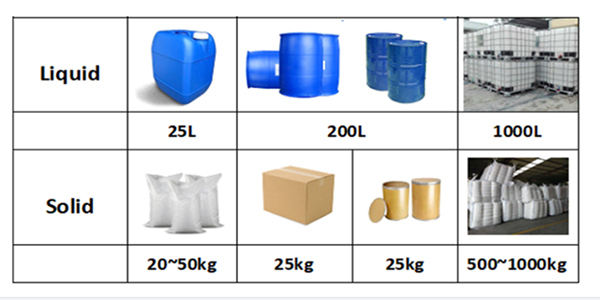Cyclohexanone CAS 108-94-1
Product name:Cyclohexanone
CAS:108-94-1
MF:C6H10O
MW:98.14
EINECS:203-631-1
Melting point:-47°C
Boiling point:155°C
Density:0.947 g/ml at 25°C
Appearance:Colorless liquid
Purity:99%
Hazard class:3
HS code:2914220000
Package:1 L/bottle, 25 L/drum, 200 L/drum
Cyclohexanone is colorless transparent liquid with strong irritation. It is soluble in ethanol and ether.
1.Cyclohexanone is an important chemical raw material and a major intermediate for the manufacture of nylon, caprolactam and adipic acid.
2.Cyclohexanone is an important industrial solvent, it can be used in paints, especially those containing nitrocellulose, vinyl chloride polymers and their copolymers, or methacrylate polymer paints.
3. Cyclohexanone is used as good solvent for organophosphorus pesticides and many similar pesticides.
4. Cyclohexanone is used as adhesive solvent of piston aviation lubricating oil, grease, wax and rubber.
5. Cyclohexanone is used for dyeing and fading.
1 kg/bag or 25 kg/drum or 50 kg/drum or according to customers' requirement.

1, T/T
2, L/C
3, Visa
4, Credit card
5, Paypal
6, Alibaba trade Assurance
7, Western union
8, MoneyGram
9, Besides, sometimes we also accept Alipay or WeChat.

Storage precautions Store in a cool, ventilated warehouse.
Keep away from fire and heat sources.
The storage temperature should not exceed 37℃.
Keep the container tightly closed.
It should be stored separately from oxidants and reducing agents, and avoid mixed storage.
Use explosion-proof lighting and ventilation facilities.
It is forbidden to use mechanical equipment and tools that are prone to sparks.
The storage area should be equipped with leakage emergency treatment equipment and suitable storage materials.

Yes, cyclohexanone is harmful to humans. Here are some key points about its potential health effects:
1. Inhalation: Inhalation of cyclohexanone vapor can irritate the respiratory tract, causing symptoms such as coughing, throat irritation and difficulty breathing. Long-term exposure may cause more serious respiratory problems.
2. Skin Contact: Cyclohexanone can cause skin irritation. Prolonged or repeated contact may cause dermatitis. It is recommended to wear protective gloves when handling.
3. Eye Contact: It can cause severe eye irritation. Contact with eyes can cause redness, pain and potential damage.
4. Ingestion: Cyclohexanone may be harmful if ingested and may cause nausea, vomiting, and abdominal pain. It may be toxic if swallowed.
5. Long-term effects: Long-term exposure to cyclohexanone may cause more serious health effects, including potential effects on the liver and kidneys.

When transporting cyclohexanone, it is important to follow specific precautions to ensure safety and compliance with regulations. Here are some key considerations to take into account:
1. Regulatory Compliance: Ensure that shipping complies with local, national and international regulations regarding hazardous materials. Cyclohexanone is classified as a flammable liquid and therefore must be shipped in accordance with relevant guidelines (e.g. OSHA, DOT, IATA).
2. Packaging: Use appropriate containers that are compatible with cyclohexanone. The containers should be tightly sealed and clearly marked with correct hazard symbols and handling instructions.
3. Temperature control: During transportation, cyclohexanone should be kept away from heat sources and direct sunlight and stored in a cool and dry place to prevent vaporization and flammability.
4. Ventilation: Ensure that the transport vehicle is well ventilated to prevent the accumulation of vapors, which can be harmful if inhaled.
5. Avoid Mixing: Do not transport cyclohexanone together with incompatible substances (such as strong oxidizers, acids or bases) to prevent dangerous reactions.
6. Personal Protective Equipment (PPE): Personnel involved in the transport of cyclohexanone should wear appropriate PPE, including gloves, goggles, and flame retardant clothing to minimize exposure.
7. Emergency Procedures: Have emergency procedures in place in case spills or leaks occur during transport. This includes having spill kits and fire extinguishers readily available.
8. Training: Ensure that all personnel involved in handling and transporting cyclohexanone receive appropriate safety procedures and emergency response training.










